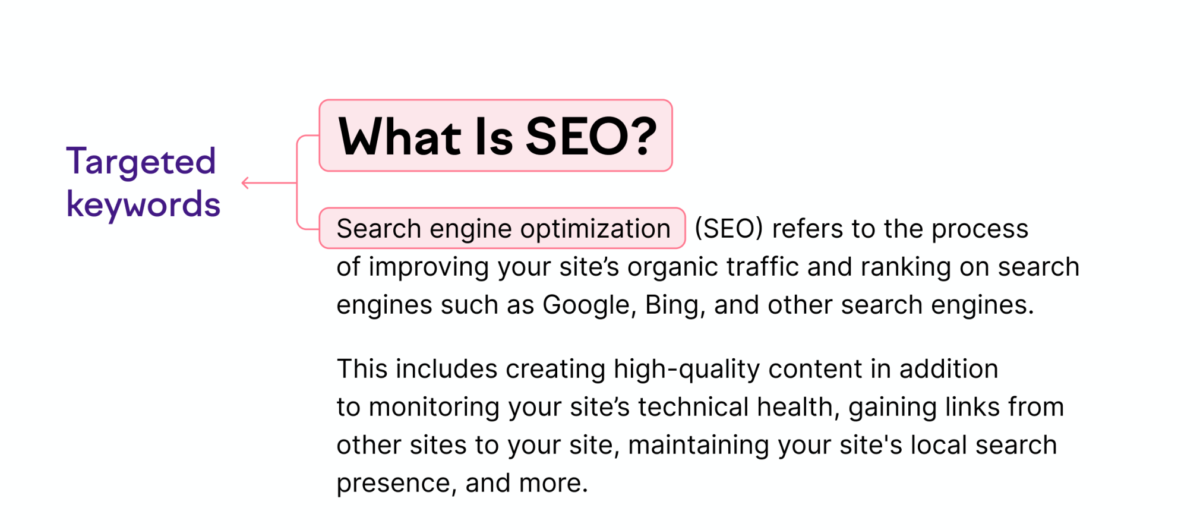In today’s competitive online world, it’s more important than ever for lawyers and law firms to stand out and attract potential clients. That’s where SEO (Search Engine Optimization) comes into play. By optimizing your online presence, you can ensure that your firm ranks higher in search engine results and gets found by the people who need your services the most.
In this blog post, we’re going to break down the ins and outs of SEO for lawyers and law firms, providing you with 8 expert tips for supercharging your online presence and boosting your law firm’s success.
Table of Contents
1. Understand SEO Basics for Lawyers
Before we dive into the nitty-gritty of SEO for lawyers, let’s take a step back and clarify what SEO is.
In a nutshell, Search Engine Optimization is the art and science of optimizing your website and online content so that search engines like Google, Bing, and Yahoo rank your pages higher in search results.
The higher you rank, the more visibility your website gets, and ultimately, the more potential clients come knocking at your door.
Importance of Keywords in SEO
Now, you might be wondering, “What’s the secret sauce that makes search engines love my website?”
Well, it all starts with keywords.
Keywords are the words and phrases that people type into search engines when they’re looking for information, products, or services.
For lawyers and law firms, there are two types of keywords you need to pay special attention to:
- Lawyers: Keywords related to specific legal practices or areas of expertise are crucial. Think “personal injury lawyer,” “divorce attorney,” or “criminal defense lawyer.” By targeting these keywords in your content and optimization efforts, you’ll attract users who are actively searching for the legal services you provide.
- Law firm: Don’t forget about the general terms that encompass your entire practice, such as “law firm,” “legal services,” or “attorneys near me.” These broader keywords can help you cast a wider net and reach a larger audience.
Remember, identifying and targeting the right keywords is the foundation of any successful SEO strategy, especially for lawyers and law firms. So, invest time and effort into researching keywords that are relevant, high-value, and in line with your practice’s specialties.

2. Keyword Research For Law Firms
Alright, now that we’ve established the importance of keywords let’s talk about how to find the best ones for your law firm.
Thankfully, there are several tools out there designed to help you uncover the goldmine of keywords that will drive more traffic and clients to your website. Here are three of my favorites:
- Google Keyword Planner: This free tool from Google is a great starting point for your keyword research journey. It not only provides you with keyword suggestions based on your input but also gives you insights into the search volume and competition levels for those keywords.
- SEMRush: A powerful all-in-one SEO tool, SEMRush offers an extensive keyword research feature that can help you discover new keywords, analyze their potential, and even track your keyword rankings over time. This is particularly useful for monitoring your law firm’s SEO progress and making data-driven decisions.
- Ahrefs: Another fantastic option for keyword research is Ahrefs. This tool provides a wealth of information on keywords, including search volume, keyword difficulty, and related keyword ideas. Additionally, Ahrefs offers a comprehensive site audit feature that can help you uncover opportunities for improving your on-page SEO.
Identify High-Value and Relevant Keywords for Lawyers
When it comes to selecting the perfect keywords for your law firm’s SEO, focus on finding high-value and relevant terms that accurately represent your practice and the services you offer.
Here are some tips to help you identify those keywords:
- Look for keywords with a good balance between search volume and competition level. High search volume indicates that many people are searching for those terms, while lower competition levels mean it’s easier to rank for those keywords.
- Consider long-tail keywords, which are longer and more specific phrases that users might search for. These keywords often have less competition and can drive highly targeted traffic to your website. For example, instead of just targeting “divorce attorney,” you might target “divorce attorney for high net worth individuals.”
- Analyze your competitor’s websites to see which keywords they are targeting and how they are ranking for those terms. This can give you insights into potential keyword opportunities that you might have overlooked.
Remember, the goal is to choose keywords that will bring qualified traffic to your website—users who are actively seeking the legal services you provide. By focusing on high-value and relevant keywords, you’ll be well on your way to boosting your law firm’s online presence and generating more leads.

3. On-Page SEO for Lawyers
On-page SEO is a critical aspect of any successful digital marketing strategy for lawyers and law firms. By optimizing your website’s content and structure, you can improve your SERPs and increase your online visibility to attract more clients.
Optimizing Title Tags
Title tags are clickable headlines that appear in search engine results, and they play a crucial role in on-page SEO.
To optimize your title tags, include your target keywords and make sure they accurately represent the content of the page. Keep them under 60 characters to ensure they display properly in search results.
Here’s an example of an employment law firm: “Top Employment Law Firm | [Your Law Firm Name].”
Meta Descriptions
Meta descriptions are brief snippets of text that appear beneath the title tags in search engine results. While they don’t directly impact your rankings, they play a vital role in enticing users to click through to your website.
To optimize your meta descriptions, include your target keywords and a compelling call-to-action. Keep them under 160 characters to ensure they display correctly.
Here’s an example: “Find expert lawyers at [Your Law Firm Name] specializing in employment law. Get a free consultation today.”
Header Tags
Header tags (H1, H2, H3, etc.) are used to structure your content and make it easier for both users and search engines to understand.
The H1 tag should be used for the main heading of your page, while H2, H3, and so on are used for subheadings. Make sure to include your target keywords in your header tags to signal to search engines what your content is about.
Here’s an example of a header tag: “Why Choose [Your Law Firm Name] as Your Employment Lawyers.”
Internal Linking and Anchor Text
Internal linking is the practice of linking to other pages on your website from within your content. This helps search engines understand the structure of your site and can also keep users engaged by encouraging them to explore more of your content.
When creating internal links, use descriptive anchor text that includes your target keywords, as this helps search engines understand the context of the link.
For example, you could write, “Learn more about our personal injury services here,” and link the phrase “personal injury services” to your personal injury practice area page.
4. Content Creation and Optimization
Creating high-quality, informative, and engaging content is the backbone of any successful SEO strategy. Not only does it help establish your law firm as an authority in your field, but it also keeps users on your site longer and encourages them to share your content with others.
To achieve this, focus on creating various types of content that cater to the needs of your audience:
- Blog posts: Publish informative and engaging blog posts that address common legal questions, discuss recent developments in your practice area, or provide insights into legal trends. This can help drive organic traffic to your site and position your law firm as a trusted resource.
- Case studies: Showcase your law firm’s expertise and success by featuring case studies of past clients. This not only demonstrates your firm’s competence but also builds trust with potential clients who are looking for a law firm with a proven track record.
- Practice area pages: Create dedicated pages for each of your practice areas, highlighting your expertise, services, and successful cases in those areas. This allows users to find specific information about your legal services and helps search engines understand the scope of your practice.
Use Keywords Naturally
When incorporating your target keywords into your content, make sure to do so naturally and avoid keyword stuffing, which can harm your SEO efforts. Instead, write in a way that sounds authentic and flows smoothly.
For example, you could say, “Our employment lawyers have years of experience handling cases like yours,” to include the keywords “employment lawyers” while still sounding genuine.
Update and Repurpose Old Content
Don’t forget about your old content! Regularly review and update your existing content to ensure it remains relevant, accurate, and informative. This can help improve your search engine rankings and breathe new life into underperforming content.
Additionally, consider repurposing old content into new formats, such as turning a blog post into a video or a case study into an infographic. This allows you to reach a wider audience and maximize the value of your existing content.
5. Local SEO for Law Firms
Local SEO is a critical aspect of online marketing for lawyers and law firms. Since most legal clients search for attorneys in their geographic area, optimizing your online presence for local search is essential. By doing so, you increase the chances of being found by potential clients in your area who are actively seeking legal services.
Google My Business Optimization
One of the most effective ways to improve your local SEO is by optimizing your Google My Business (GMB) listing. GMB is a free tool that allows you to manage your law firm’s online presence across Google, including search and maps.
Ensure your GMB listing is complete, accurate, and up-to-date, including your business name, address, phone number, website, and hours of operation. Add photos of your office and team, and choose the appropriate categories to describe your law firm and practice areas.
Local Citations and NAP Consistency
Local citations are online mentions of your law firm’s name, address, and phone number (NAP). They can be found on business directories, social media platforms, and other websites.
Ensuring that your NAP information is consistent across all online platforms is crucial for local SEO. Search engines use NAP consistency as a signal to determine the legitimacy and trustworthiness of a business.
To improve your local SEO, audit your online citations, and make sure your NAP information is accurate and consistent everywhere it appears.
Gather and Manage Client Reviews
Positive client reviews not only help build trust with potential clients but also play a significant role in local SEO. Search engines consider the number and quality of reviews as ranking factors for local search results. Encourage your satisfied clients to leave reviews on your Google My Business listing, as well as other popular review platforms like Yelp and Avvo.
Make sure to respond professionally to both positive and negative reviews, as this demonstrates that you value your clients’ feedback and are committed to providing exceptional service.
6. Build High-Quality Backlinks
Backlinks, also known as inbound or incoming links, link from one website to another. They play a crucial role in SEO because search engines view them as “votes of confidence” for your website.
In other words, when a reputable site links to your law firm’s website, it signals to search engines that your content is valuable and trustworthy.
Consequently, having a strong backlink profile can significantly improve your search engine rankings and drive more organic traffic to your site.
SEO Strategies for Building Backlinks
Building high-quality backlinks requires time and effort, but it’s well worth it for the long-term success of your law firm’s SEO. Here are three proven strategies to help you build valuable backlinks:
- Guest Blogging: Reach out to reputable legal blogs or industry-related websites and offer to write a guest post for their audience. This not only positions you as an expert in your field but also provides an opportunity to include a link back to your law firm’s website, building your backlink profile.
- Networking with Local Businesses: Partner with local businesses, organizations, or community groups that share a common interest or client base. This can lead to mutually beneficial backlink opportunities, such as featuring each other in blog posts or resource pages.
- Legal Directories: Submit your law firm’s website to reputable legal directories, such as FindLaw, Avvo, and Justia. These directories often allow you to include a link back to your site, which can help strengthen your backlink profile. Make sure to choose directories that are relevant and reputable, as low-quality directories can hurt your SEO.
Remember, the key to successful backlink building is focusing on quality over quantity. It’s better to have a few high-quality, authoritative backlinks than a large number of low-quality, spammy ones. By investing time and effort into building a strong backlink profile, you’ll improve your law firm’s search engine rankings and increase your online visibility.
7. Technical SEO for Lawyers
Technical SEO ensures that your law firm’s website is optimized for search engines and provides a seamless user experience across devices. By addressing factors like mobile-friendliness, site speed, and URL structure, you can improve your search engine rankings and attract more potential clients.
Mobile-Friendliness
In today’s digital landscape, having a mobile-friendly website is no longer optional—it’s a must. With the majority of users accessing the internet via their smartphones, your law firm’s website must be optimized for mobile devices.
This includes responsive design, easy-to-read text, and touch-friendly navigation elements. By ensuring your site is mobile-friendly, you’ll provide a seamless user experience for potential clients and improve your search engine rankings.
Site Speed Optimization
Site speed is a crucial factor in both user experience and SEO. Slow-loading websites can frustrate users, causing them to leave your site and look elsewhere for legal services. Additionally, search engines like Google consider site speed when ranking websites.
According to a study, a 1-second delay in page load time can lead to a 7% reduction in conversions.
To optimize your site speed, consider compressing images, enabling browser caching, and reducing the number of plugins on your site.
Properly Structured URLs
A well-structured URL is essential for both user experience and search engine optimization. It should be descriptive, concise, and easy to understand, giving users and search engines a clear indication of what the page is about.
Additionally, incorporating your target keywords into your URLs can help improve your search engine rankings.
To create properly structured URLs, use hyphens to separate words, avoid using special characters, and keep them as short and descriptive as possible.
8. Monitor & Analyze Your SEO Performance
To ensure the success of your law firm’s SEO efforts, it’s essential to monitor and analyze your performance regularly. This allows you to identify areas of improvement and make data-driven decisions to optimize your online presence further.
Two of the most popular and powerful tools for tracking your SEO performance are:
- Google Analytics: This free tool from Google provides a wealth of information about your website’s traffic, user behavior, and engagement. With Google Analytics, you can track metrics like organic search traffic, page views, time on site, and bounce rate, helping you gain insights into your law firm’s online performance.
- Google Search Console: Another invaluable tool from Google, Search Console allows you to monitor your website’s search performance, submit sitemaps, and identify any crawl errors or issues that could be affecting your SEO. You can also use it to track your keyword rankings and discover the search queries that drive traffic to your site.
Identify Areas of Improvement
By regularly monitoring your SEO performance, you can identify areas where your law firm’s online presence can be improved. Some key areas to focus on include:
- Traffic Growth: Keep an eye on your organic search traffic over time. If your traffic is steadily increasing, it’s a sign that your SEO efforts are working. If not, you may need to reevaluate your strategy and identify areas for improvement.
- Keyword Rankings: Track your rankings for your target keywords using tools like Google Search Console, SEMRush, or Ahrefs. If you notice a drop in rankings, investigate the cause and make necessary adjustments to your SEO strategy.
- Bounce Rate: A high bounce rate could indicate that users aren’t finding what they’re looking for on your website or that your site isn’t user-friendly. Analyze your website’s user experience, content, and navigation to identify areas for improvement and reduce bounce rate.
By consistently tracking and analyzing your law firm’s SEO performance, you can make informed decisions to optimize your online presence, attract more potential clients, and grow your practice.
Conclusion
SEO for lawyers is a critical component of a successful online marketing strategy in today’s competitive legal landscape. By understanding the basics of SEO, conducting thorough keyword research, optimizing on-page elements, creating high-quality content, focusing on local SEO, building authoritative backlinks, addressing technical SEO factors, and regularly monitoring your performance, you can improve your law firm’s online visibility and attract more clients.
Remember that SEO is an ongoing process that requires time, effort, and commitment. By staying up-to-date with the latest best practices and continually refining your strategy, you can ensure that your law firm stays ahead of the competition and continues to grow. Now is the time to put these expert tips into action and start reaping the benefits of a successful law firm SEO strategy.

Ali is a digital marketing blogger and author who uses the power of words to inspire and impact others. He has written for leading publications like Business2Community, Inc. Magazine, and Marketing Profs. When not writing, he enjoys spending time with his family.





